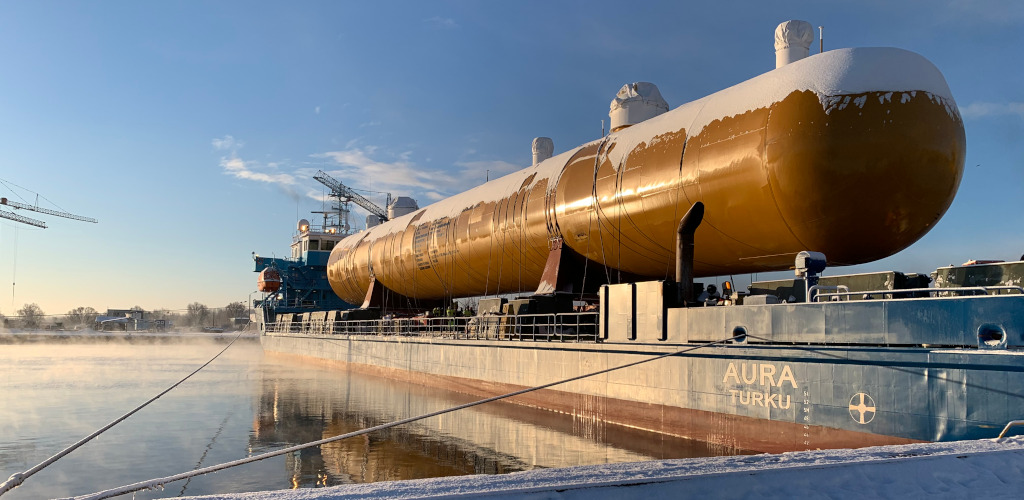May 09 | 2024
Poles Quietly Leading the Way in Engineering Excellence
 By Ilya Goncharov
By Ilya GoncharovFrom Issue 3, 2024 of Breakbulk Magazine
 I remember that 10-15 years ago some producers of lowbed semitrailers were embarrassed when we discussed how some of the components of their trailers were made in Poland. Today, on the roads of the USA or Germany you can see plenty of super-heavy loads with “Made in Poland” markings and it no longer surprises anyone in our field.
I remember that 10-15 years ago some producers of lowbed semitrailers were embarrassed when we discussed how some of the components of their trailers were made in Poland. Today, on the roads of the USA or Germany you can see plenty of super-heavy loads with “Made in Poland” markings and it no longer surprises anyone in our field.How did this happen? Poland is increasingly being recognized as the “new Germany’’ of Europe, not just for its burgeoning economic growth but also for its important role in the project cargo business.
With its strategic location, robust economic policies and growing industrial base, Poland is fast becoming a pivotal hub for heavy industry and project cargo in Europe, drawing parallels to China’s manufacturing prowess.
Poland’s economy is on an upward trajectory, its growth underpinned by access to cheaper energy resources and a favorable business climate which attracts a slew of manufacturers and industrial projects.
As firms previously oriented toward traditional manufacturing strongholds like Germany and Italy begin to pivot to Poland, the country’s appeal as a cost-effective yet high-quality manufacturing hub is reinforced. Why? I think it’s because Poles know how to work hard. They are doers, not dreamers and will retain this even in 2024, while some other countries might have relaxed.
Poland’s evolution into a manufacturing and project cargo powerhouse has earned it the moniker “China inside Europe”. This comparison stems from Poland’s ability to produce heavy industrial goods, such as bullet tanks, boilers and tank vessels, traditionally associated with countries known for their manufacturing scale and capacity.
Quality Manufacturing at Competitive Prices
Poland is carving out a niche for itself by offering high-quality manufacturing at prices that undercut Europe’s traditional leaders like Germany and Italy. This competitive edge is bolstered by an influx of investment in various sectors, ranging from boilers to wind turbines and transformers. The result is a robust, diversified industrial base capable of catering to a global clientele seeking cost-effective yet reliable project cargo solutions.
Poland’s approach is one of quiet confidence. Without the fanfare of flashy marketing, the country is letting its growing project cargo business speak for itself. The results are impressive, with a significant increase in export and import shipments that underscore Poland’s rising stature in the global market. Made in Poland.
Amid its industrial growth, Poland is also focusing on energy transition and infrastructure development. A commitment to construct three new nuclear power plants (each costing about US$10 billion and set to generate thousands of jobs as well as substantial tax revenue) and 24 small modular reactors, in collaboration with American and European partners, signifies a strategic move toward sustainable and reliable energy sources. This pivot not only supports domestic industry but also ensures Poland’s position as a vital energy and industrial hub in the long term.
While Poland is on the rise, Germany faces challenges, notably in project cargo logistics due to stringent permit processes and infrastructural constraints. Germany’s decision to phase out nuclear power contrasts sharply with Poland’s ambitious nuclear and renewable energy initiatives, further emphasizing their diverging paths.
In conclusion, Poland’s strategic investments, favorable business climate and commitment to energy and industrial advancement are setting the stage for its emergence as a pivotal project cargo and industrial hub in Europe.
With its sights set on sustainable growth and innovation, the country is well-positioned to redefine its role on the European and global stage, reminiscent of Germany’s past economic dominance, but with a distinctively Polish flair.
Ilya Goncharov is global 3PL project manager, BDM, at 3P Logistics Group.
Europe’s project market over the next five years will be the focus of a Main Stage session at Breakbulk Europe 2024. “Project Outlook – Europe Focus”, presented by Sharanya Kumaramurthy, market intelligence manager at the European Industries Council (EIC), will take place on Thursday, 23 May.
TOP PHOTO: deugro delivers project cargo for Polish petrochemical project. CREDIT: deugro
